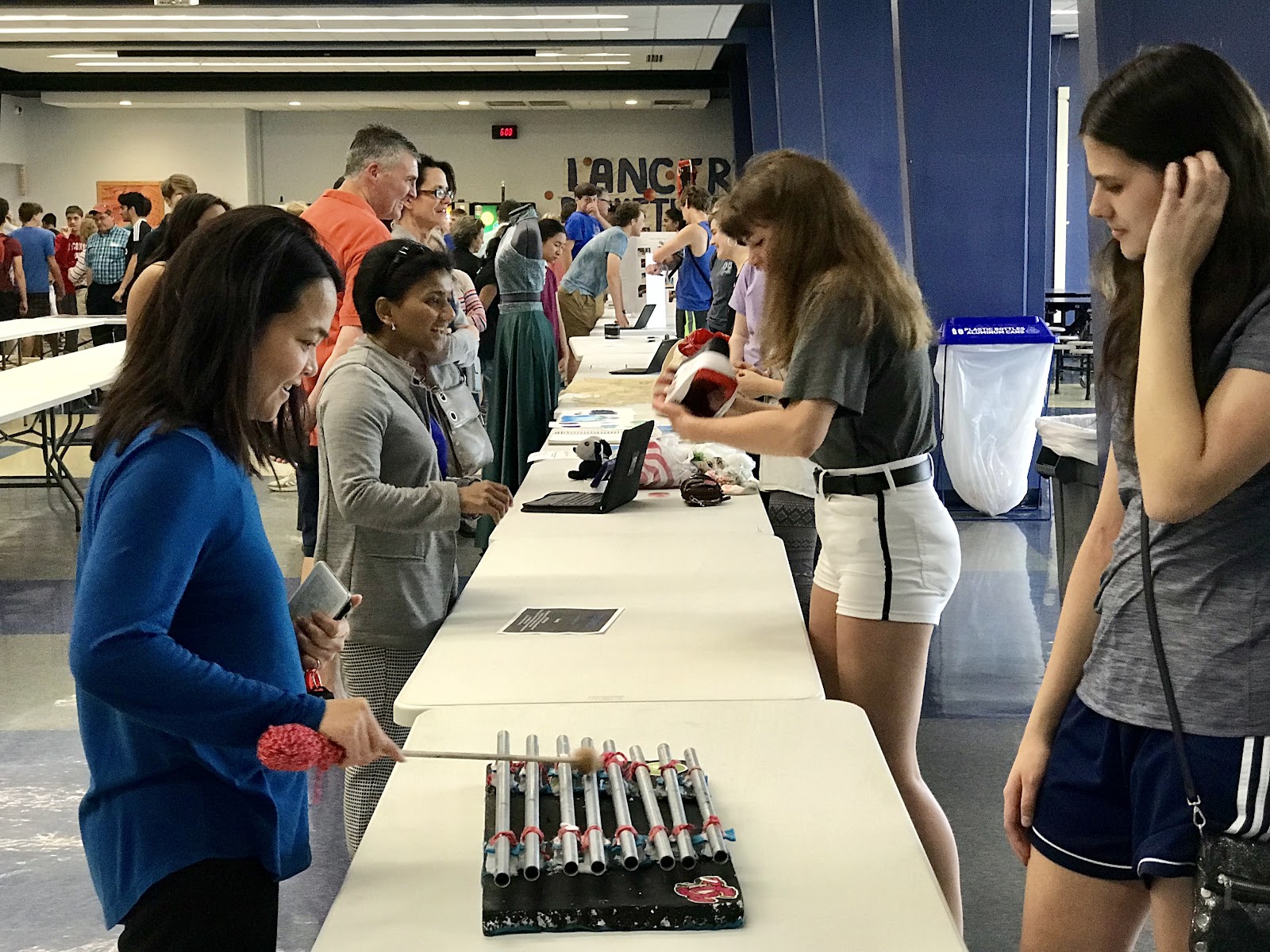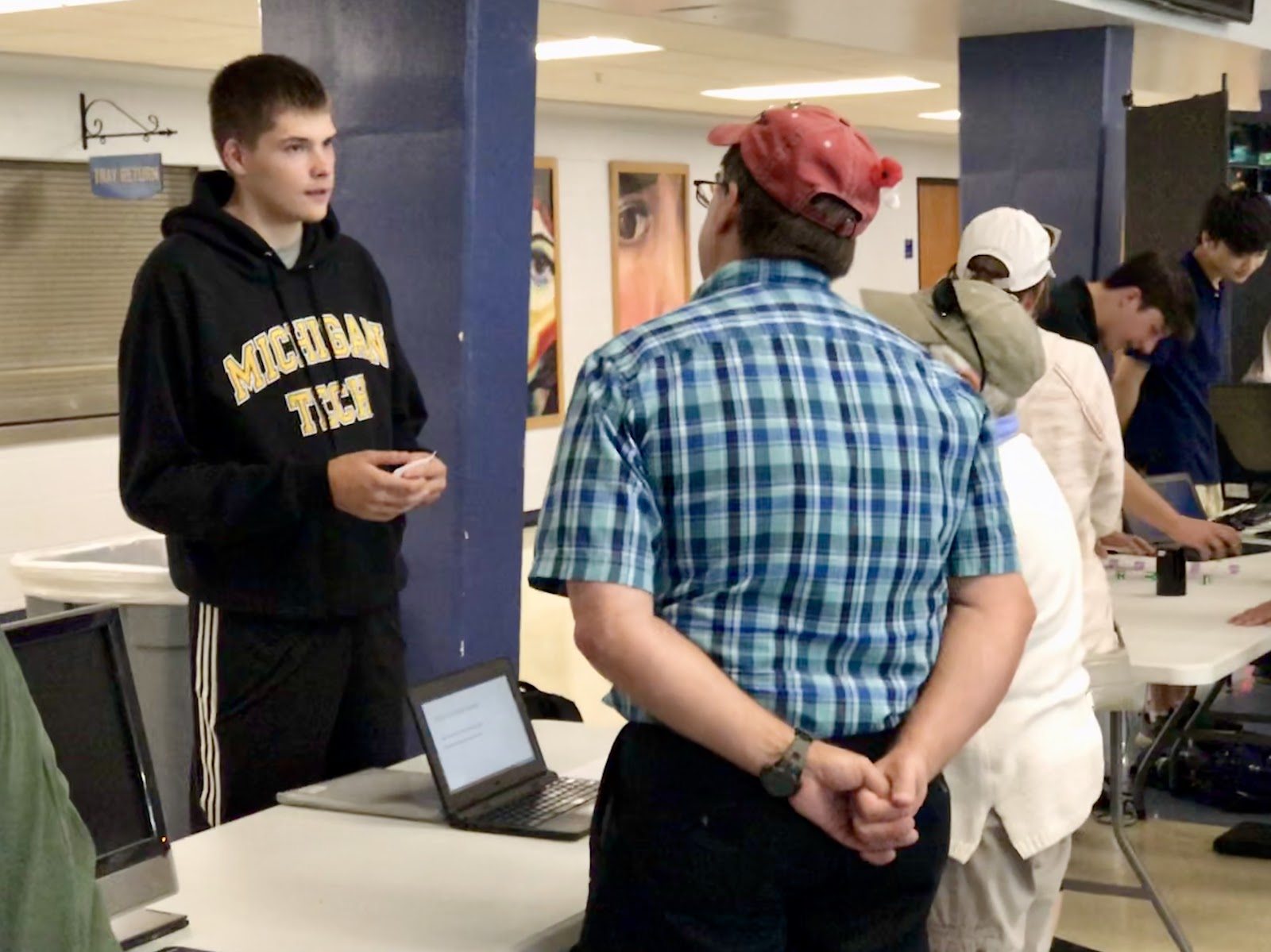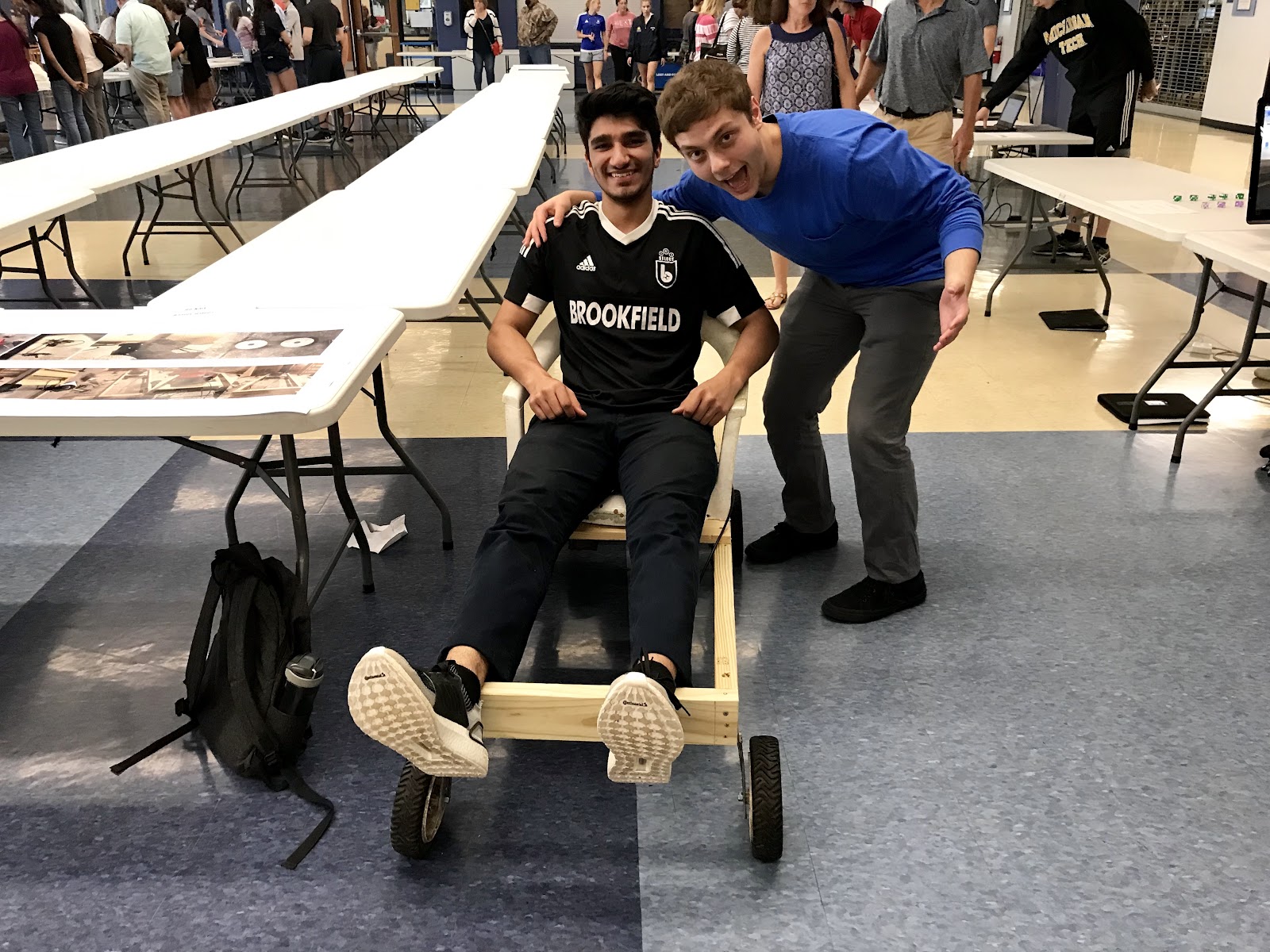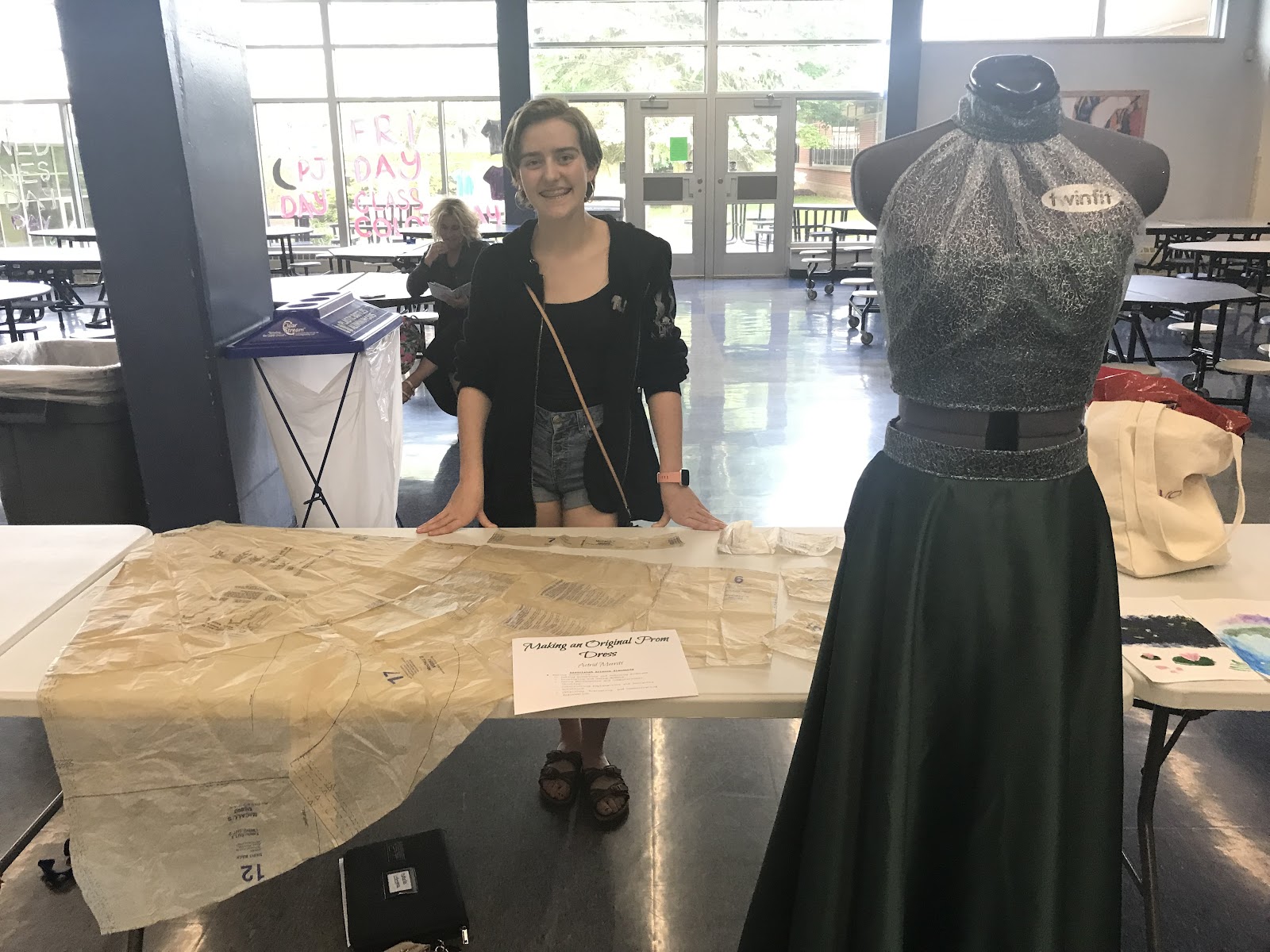After 20 years of teaching at Brookfield Central, I am saying goodbye. Although I spent the majority of that time in the physics classroom alongside my learners. That changed for my last 18 weeks. I ended up in a place similar to where I started, teaching chemistry and biology. So, rather than dealing with juniors and seniors at the end of their high school careers, I was in classrooms with freshmen and sophomores still trying to find their place. At the same time, I was learning and teaching a set curriculum I hadn't taught in over a decade. So, we were learning. But, of course, I already knew the content. The point of this post is to take a step back, reflect, and share the gratitude from the last students I had in my 20 years at Brookfield Central High School, as expressed through the cards and notes they made for me on my last day with them. I don't take many "yay me" moments. But after 20 years, I'll soak this one in.
When I attended PBL world 4 years ago, I was introduced to the idea of a project exhibition night. A night for students to share their learning beyond the classroom and with the greater school community. It was a night that wasn’t for grading. It truly meant for sharing of work. This week, we held our 6th project expo night. This event was directly inspired by the ideas I heard at PBL world back in 2015. I am proud of a lot of things that I’ve been able to implement in my classroom, and this is near the top of the list.
One of the main reasons is the simple visual that one will see when they walk into the expo. Students talking about their work to parents.





Open houses and science fairs are things that I am used to seeing at the elementary level. At the high school level, parents are rarely invited to events. Outside of athletics, these events tend to be performances by the arts. The other event the parents attend to learn about academic performance is parent teacher conferences. We tend to have good attendance to conferences. But, seeing the engagement of parents at the expo was amazing. In fact, many parents told me how unique the expo was and how much they enjoyed it.
It was truly powerful to be able to see a student having a conversation with a parent about their work. This was not simply discussing the score on a test. Because of the nature of their project, they were sharing out on their interests.
If you’ve been thinking about implementing something like this, let me explain the implementation plan of our night.
The first consideration is what are students presenting. Honestly, there are a host of different things that student assignments that could be presented to a general audience. But the product should be unique to the learner or group of learners. You don’t want to invite people to view the same product 90 different times. The idea of choosing passion project was that what would be presented would go beyond the academic goals of our course. The product would communicate something about the learner as a person.
The first year back from PBL World, my co teacher Andelee Espinosa and I had students work on a long term project connecting physics concepts to a sport of their choice. In the end they created a video to be shared. Although they were made public, these videos were never showcased beyond our classroom. Unlike the exhibition nights we had heard about, our project seemed to end when students finished their videos. They may have been public, but they never really left our classroom.
These passion projects could easily have been done as an in class showcase. But I feel like we’d be losing out on an opportunity to carry the momentum outside of our 4 classroom walls. Having the event outside of the classroom and outside of the school day, helps to give it a different feeling. It seems simple, but it works. So disrupting time and location can go a long way to make the event feel more like an even that just another day in class. I have to thank our amazing facilities crew for taking care of the set-up and take down of the tables we needed in the cafeteria.
My biggest concern for the event was having an audience. I didn’t believe if I put out an invitation that people would actually show up. So, I decided that I could leverage the learners in my classroom to be an audience. The expo was divided into 2 parts. In the first part, half of the students present would be sharing about their project. Those presenting would be stationed at a table with their materials while the other half would function as the audience. Then, students would switch roles. This created a built in audience. Even if no parents showed up, it would still ensure that learners would be able to see and present to peers outside of their classroom.
I was amazed that the number of parents who attended the actual presentation night. A simple email sent to parents and a couple of follow-up reminders was all that it took to get the audience that we wanted. I was excited to see parents I had never spoken to at conferences. It was wonderful to see how proud many of them were while watching their child present to other adults.
Although the overall expo is always a success, some projects are presented better than others. The best presentations find a way to make the content or concept applicable to all people. Honestly, the students who are most passionate about their topics tend to have the best stations. They are able to communicate their learning, create an interactive experience, or showcase the work they did in a unique manner.



Making the expectations for learners clear is also essential to a successful event. Showing images from past events or events that you want to emulate are essential. Students need to visualize what they are being asked to do. I create videos showing each expo we’ve had. It’s a great way to share what we did with the world. More importantly, though, it serves as a great way to introduce the project and explain the endpoint.
One of the main reasons is the simple visual that one will see when they walk into the expo. Students talking about their work to parents.
Open houses and science fairs are things that I am used to seeing at the elementary level. At the high school level, parents are rarely invited to events. Outside of athletics, these events tend to be performances by the arts. The other event the parents attend to learn about academic performance is parent teacher conferences. We tend to have good attendance to conferences. But, seeing the engagement of parents at the expo was amazing. In fact, many parents told me how unique the expo was and how much they enjoyed it.
It was truly powerful to be able to see a student having a conversation with a parent about their work. This was not simply discussing the score on a test. Because of the nature of their project, they were sharing out on their interests.
If you’ve been thinking about implementing something like this, let me explain the implementation plan of our night.
The first consideration is what are students presenting. Honestly, there are a host of different things that student assignments that could be presented to a general audience. But the product should be unique to the learner or group of learners. You don’t want to invite people to view the same product 90 different times. The idea of choosing passion project was that what would be presented would go beyond the academic goals of our course. The product would communicate something about the learner as a person.
The first year back from PBL World, my co teacher Andelee Espinosa and I had students work on a long term project connecting physics concepts to a sport of their choice. In the end they created a video to be shared. Although they were made public, these videos were never showcased beyond our classroom. Unlike the exhibition nights we had heard about, our project seemed to end when students finished their videos. They may have been public, but they never really left our classroom.
These passion projects could easily have been done as an in class showcase. But I feel like we’d be losing out on an opportunity to carry the momentum outside of our 4 classroom walls. Having the event outside of the classroom and outside of the school day, helps to give it a different feeling. It seems simple, but it works. So disrupting time and location can go a long way to make the event feel more like an even that just another day in class. I have to thank our amazing facilities crew for taking care of the set-up and take down of the tables we needed in the cafeteria.
My biggest concern for the event was having an audience. I didn’t believe if I put out an invitation that people would actually show up. So, I decided that I could leverage the learners in my classroom to be an audience. The expo was divided into 2 parts. In the first part, half of the students present would be sharing about their project. Those presenting would be stationed at a table with their materials while the other half would function as the audience. Then, students would switch roles. This created a built in audience. Even if no parents showed up, it would still ensure that learners would be able to see and present to peers outside of their classroom.
I was amazed that the number of parents who attended the actual presentation night. A simple email sent to parents and a couple of follow-up reminders was all that it took to get the audience that we wanted. I was excited to see parents I had never spoken to at conferences. It was wonderful to see how proud many of them were while watching their child present to other adults.
Although the overall expo is always a success, some projects are presented better than others. The best presentations find a way to make the content or concept applicable to all people. Honestly, the students who are most passionate about their topics tend to have the best stations. They are able to communicate their learning, create an interactive experience, or showcase the work they did in a unique manner.
Making the expectations for learners clear is also essential to a successful event. Showing images from past events or events that you want to emulate are essential. Students need to visualize what they are being asked to do. I create videos showing each expo we’ve had. It’s a great way to share what we did with the world. More importantly, though, it serves as a great way to introduce the project and explain the endpoint.
Since the event occurs outside of the school day, I cannot force students to attend. It is completely voluntary to show up. But by attending, they can be excused from the class on the final day. This is a huge carrot for high school students. I thank my administration for approving of this. In addition, once parents find out about the event, they are more likely to want to make sure that their child attends. This past expo, 90% of my students showed up!
- The smaller you start, the more likely you will follow through. The biggest step is committing to a date on the calendar. Once you communicate it to students and parents, that will definitely put the necessary fire under you to make sure it happens.
- So what student projects do you have that you would love to share with parents? Be sure to pick one that communicates more about the student as an individual than you as a teacher.
- Where you you stage an expo? Check availability of you gym or cafeteria.
- When can you hold it so that you can get maximum parent attendance? If you’re not sure, send out a Google form to parents asking for feedback.
I would love to hear about what you are doing in you school or classroom.


Comments
Post a Comment